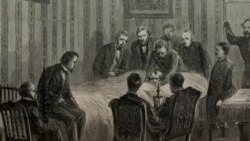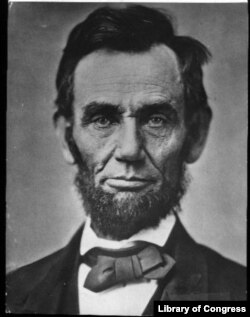The assassination of President Abraham Lincoln 150 years ago changed the course of U.S. history. Museums and historic institutions across the country are featuring special exhibits, plays and musical performances to commemorate that seminal event on April 14, 1865.
At Ford's Theatre in the nation's capital, where Lincoln was shot, objects from that tragic evening are being presented together for the first time. The theater also is hosting more than 150 Civil War historians to recreate the all-night vigil for Abraham Lincoln.
Sic semper tyrannis
On April 14, 1865, as Lincoln and his wife Mary sat in the presidential box watching a play at the Washington theater, a shot rang out and the president slumped in his chair, mortally wounded.
Shouting "Sic semper tyrannis" – a Latin phrase meaning "thus always to tyrants" – actor and Confederate sympathizer John Wilkes Booth dropped his pistol and fled. Lincoln was carried to a house across the street, where he died the following morning.
He was the first American president to be assassinated.
The 'Great Emancipator'
Many still regard Lincoln as one of this country's greatest and most beloved presidents. His passing came just as he was leading the nation out of a bloody, four-year civil war that had led to the deaths of approximately 620,000 Union and Confederate soldiers.
Saving the Union was one of the most remarkable achievements of his presidency, says Michelle Krowl, a historian at the Library of Congress in Washington.
"In the hands of a lesser man, hands of a less resolute person, one who is less politically astute, it could’ve easily gone the other way," she said.
"There were times when Lincoln was not sure that the war would necessarily be won. But he saw the United States as an experiment in democracy,” Krowl said, adding the 16th president “was upholding what the Founding Fathers had started. And in an era where republics that were governed by the people were very few and far between, he didn’t want that experiment in democracy to fail.”
Lincoln also helped end slavery.
The Emancipation Proclamation that he issued on January 1, 1863, declared that "all persons held as slaves within any state ... in rebellion against the United States shall be then, thenceforward, and forever free."
It set African-Americans on the path to freedom and helped set the stage for passage of the 13th Amendment to the Constitution two years later that outlawed slavery in every state.
On November 19, 1863 – four months after the Union Army defeated the Confederate Army at the Battle of Gettysburg in Pennsylvania – Lincoln gave his historic Gettysburg Address.
"When you read the Gettysburg Address and he says 'this is a Government of the people, by the people, for the people,’ he meant that," noted Krowl. "Lincoln was someone who wanted to extend rights for people. He wanted the United States to really fulfill its democratic potential to be a place that fulfilled the Declaration of Independence, 'all men created equal.'"
Historian Martin Johnson says Lincoln's Gettysburg Address became popular and important very quickly because it "condensed the lesson of the War in a very brief manner."
After the war, Johnson said, the speech was recited "over and over again, hundreds of times [at occasions] across the Union and elsewhere.... It became rooted very quickly in American memory about what the Civil War meant."
The Gettysburg Address also demonstrated Lincoln's mastery of the language and his worldwide appeal, Johnson added. “Schoolchildren around the world learn the speech as part of their lessons in English because it is recognized as one of the finest speeches by any American.”
Abraham Lincoln, the man
Lincoln's gift of language came from his love of storytelling, Krowl said. "He told stories all the time," she said, "usually with a purpose."
He was also a patient man, with a great sense of humor, and was a devoted father, she added. "You really see the more tender side of Lincoln when you hear or read about him interacting, particularly with his sons Willie and Todd, during their White House years."
Tracey Avant, curator of exhibitions at Ford's Theatre, said that's also revealed by his signature top hat, one of the objects on display in the exhibit "Silent Witnesses: Artifacts of the Lincoln Assassination."
"It’s a beautiful, iconic piece; everyone thinks of Abraham Lincoln with a top hat," she said. "But what I love about it is it’s got this beautiful band that he put on it to remember his son Willie, who had died in 1862 of typhoid fever. It still remained on the hat in 1865, and to me – I’m a parent – it speaks to how deeply he felt that loss."
The exhibit also includes the small, single-shot pistol that assassin Booth used to shoot the president.
Avant describes it as the weapon that changed the course of American history: "In one small moment, one of our greatest presidents was brought down."
Lincoln’s eyeglasses also are popular with visitors, Avant said.
An arm "had broken off at some point ... so he used a little piece of twine to tie it back together," she added. "And to me, that just humanizes him so much and makes you realize how humble he still remained even though he was the president of the United States."
Lincoln's legacy
While his life was cut short, Lincoln’s legacy lives on.
More books have been written about him than any other American president. His face appears on U.S. currency. And millions visit his memorial on the National Mall in Washington.
Many credit Lincoln’s efforts during his presidency for helping to set the foundation for the civil rights movement of the 1960s.
And Krowl believes Lincoln would have been pleased to see an African-American as president 150 years after the Civil War.
But she noted that, despite much progress, Lincoln’s vision of equality has yet to be fully realized.










